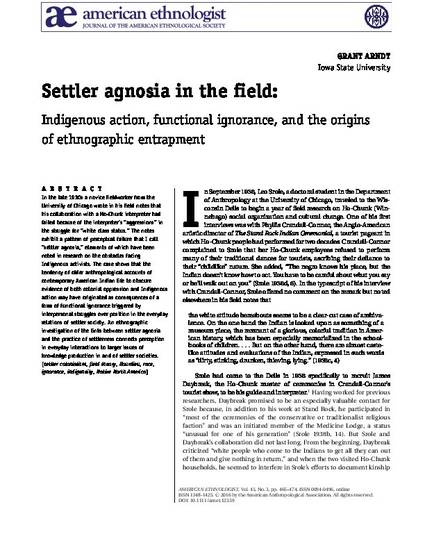
Article
Settler agnosia in the field: Indigenous action, functional ignorance, and the origins of ethnographic entrapment
American Ethnologist
Document Type
Article
Disciplines
Publication Version
Published Version
Publication Date
8-1-2016
DOI
10.1111/amet.12339
Abstract
In the late 1930s a novice fieldworker from the University of Chicago wrote in his field notes that his collaboration with a Ho-Chunk interpreter had failed because of the interpreter's “aggressions” in the struggle for “white class status.” The notes exhibit a pattern of perceptual failure that I call “settler agnosia,” elements of which have been noted in research on the obstacles facing Indigenous activists. The case shows that the tendency of older anthropological accounts of contemporary American Indian life to obscure evidence of both colonial oppression and Indigenous action may have originated as consequences of a form of functional ignorance triggered by interpersonal struggles over position in the everyday relations of settler society. An ethnographic investigation of the links between settler agnosia and the practice of settlerness connects perception in everyday interactions to larger issues of knowledge production in and of settler societies.
Copyright Owner
American Anthropological Association
Copyright Date
2016
Language
en
File Format
application/pdf
Citation Information
Grant Arndt. "Settler agnosia in the field: Indigenous action, functional ignorance, and the origins of ethnographic entrapment" American Ethnologist Vol. 43 Iss. 3 (2016) p. 465 - 474 Available at: http://works.bepress.com/grant_arndt/4/

This article is from American Ethnologist 43 (2016): 465–474, doi:10.1111/amet.12339. Posted with permission.